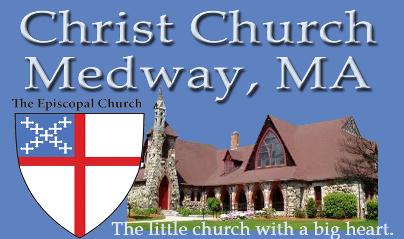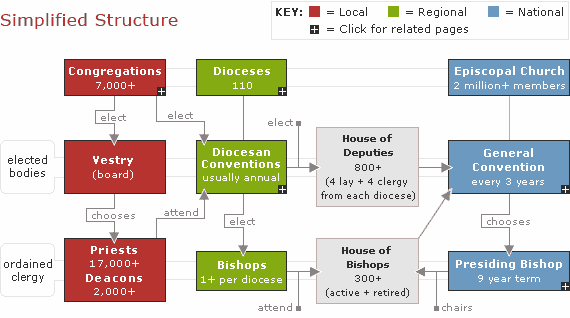FAQs about the Episcopal Church
Who Are Episcopalians?
The Episcopal Church is the American branch of the worldwide Anglican Communion and its 85 million members. There are all kinds of Episcopalians and we are very proud of how people so different form each otherwise have found something life-giving and connecting about our particular tradition of Christian faith and prayer. What is any particular Episcopal Church like? Chances are, it is like the neighborhood it is in and the people who live there. This is true of Christ Church which has been the Episcopal Church in Medway since 1871.
Q. Do Episcopalians believe in the Bible?
A. Yes, we read the Bible aloud in church every Sunday as part of the lessons. If you attend for three years straight, you will have heard almost the entire Bible. Some Episcopalians read the Bible literally while others see it as something that requires new interpretation with the passage of time. Either way, we take it very seriously, and we believe that it has much to tell us about who God is, who we are, and how God wants us to live.
Q. Do Episcopalians believe in Jesus?
A. Like other Christians, we believe that Jesus is the visible image of the invisible God. God loves us so much that God came to be one of us, and when we turned against him, crucified, and killed him, God used it as a way to heal our souls and conquer death forever for all of us.
Q. Do Episcopalians believe in sin?
A. Yes, but we also believe in forgiveness. In our view, "sin" is a word for "missing the mark" or "falling short." God knows that we don't get everything right and we need help and practical wisdom to repair along the way and to live well.
Q. What makes Episcopalians different?
A. We like to think of ourselves as simply Christians, but two things about us are quite noticeable. One is that we usually serve Communion every Sunday. That can seem strange at first, but we see it as a perfect way to have a regular experience of God that you can see and taste. We also have a strong emphasis on scripture and preaching. In this way, many people find with us the things they like best about both Roman Catholic and Protestant Christianity.
Q. What's a typical service like?
A. At most Episcopal Churches, a typical Sunday service has two parts: the Liturgy of the Word (lessons) and of Holy Communion. The Word is where we hear Scripture/Bible readings, say our prayers, and listen to the sermon. Communion is where we share the Bread and Wine as Jesus commanded us to do before he died.
Q. What kind of music do Episcopalians use?
A. Music is a big part of our worship. Some Episcopal churches only use the hymnal with an organ and choir, others provide a blend using more modern instruments such as guitar and singing. At Christ Church, we are blessed with a wonderful pipe organ and a gifted music director.
Q. Can anybody come?
A. All are welcome. We believe that God does not restrict anyone from coming to God's table, so neither do we. All are allowed to come and worship, and all are allowed to take Communion with us.
Q. How is the Church governed?
A. The Episcopal Church is rooted in a representative form of church government. The national church has a Presiding Bishop, Michael Curry, who presides over the national church in conjunction with the elected legislature, known as The General Convention. Non-ordained lay people, men and women, have a role in the governance of the church at every level including at Christ Church where elected vestry members oversee all aspects of parish life.
The Episcopal Church is divided into 110 dioceses which are geographical units including an entire state or a portion of a state. These dioceses are grouped together into nine provinces. Each diocese is led by a Bishop (for the Diocese of Massachusetts, it is Alan H. Gates with assistant Bishop, called Suffragan, Gayle Harris). Each parish belongs to a gathering of parishes, called deaneries. Christ Church is part of the Neponset River Deanery.
The Episcopal Church is the American branch of the worldwide Anglican Communion and its 85 million members. There are all kinds of Episcopalians and we are very proud of how people so different form each otherwise have found something life-giving and connecting about our particular tradition of Christian faith and prayer. What is any particular Episcopal Church like? Chances are, it is like the neighborhood it is in and the people who live there. This is true of Christ Church which has been the Episcopal Church in Medway since 1871.
Q. Do Episcopalians believe in the Bible?
A. Yes, we read the Bible aloud in church every Sunday as part of the lessons. If you attend for three years straight, you will have heard almost the entire Bible. Some Episcopalians read the Bible literally while others see it as something that requires new interpretation with the passage of time. Either way, we take it very seriously, and we believe that it has much to tell us about who God is, who we are, and how God wants us to live.
Q. Do Episcopalians believe in Jesus?
A. Like other Christians, we believe that Jesus is the visible image of the invisible God. God loves us so much that God came to be one of us, and when we turned against him, crucified, and killed him, God used it as a way to heal our souls and conquer death forever for all of us.
Q. Do Episcopalians believe in sin?
A. Yes, but we also believe in forgiveness. In our view, "sin" is a word for "missing the mark" or "falling short." God knows that we don't get everything right and we need help and practical wisdom to repair along the way and to live well.
Q. What makes Episcopalians different?
A. We like to think of ourselves as simply Christians, but two things about us are quite noticeable. One is that we usually serve Communion every Sunday. That can seem strange at first, but we see it as a perfect way to have a regular experience of God that you can see and taste. We also have a strong emphasis on scripture and preaching. In this way, many people find with us the things they like best about both Roman Catholic and Protestant Christianity.
Q. What's a typical service like?
A. At most Episcopal Churches, a typical Sunday service has two parts: the Liturgy of the Word (lessons) and of Holy Communion. The Word is where we hear Scripture/Bible readings, say our prayers, and listen to the sermon. Communion is where we share the Bread and Wine as Jesus commanded us to do before he died.
Q. What kind of music do Episcopalians use?
A. Music is a big part of our worship. Some Episcopal churches only use the hymnal with an organ and choir, others provide a blend using more modern instruments such as guitar and singing. At Christ Church, we are blessed with a wonderful pipe organ and a gifted music director.
Q. Can anybody come?
A. All are welcome. We believe that God does not restrict anyone from coming to God's table, so neither do we. All are allowed to come and worship, and all are allowed to take Communion with us.
Q. How is the Church governed?
A. The Episcopal Church is rooted in a representative form of church government. The national church has a Presiding Bishop, Michael Curry, who presides over the national church in conjunction with the elected legislature, known as The General Convention. Non-ordained lay people, men and women, have a role in the governance of the church at every level including at Christ Church where elected vestry members oversee all aspects of parish life.
The Episcopal Church is divided into 110 dioceses which are geographical units including an entire state or a portion of a state. These dioceses are grouped together into nine provinces. Each diocese is led by a Bishop (for the Diocese of Massachusetts, it is Alan H. Gates with assistant Bishop, called Suffragan, Gayle Harris). Each parish belongs to a gathering of parishes, called deaneries. Christ Church is part of the Neponset River Deanery.
Love God.
Love others.
The rest are details.
—Jesus (Matthew 22: 37-40)
Q. Why are your pastors called "priests"?
A. It is ancient tradition that goes way back to our earliest roots of Christianity when we were members of the Roman Catholic Church prior to the Reformation of the sixteenth century. A Priest is someone called to join people and represent them before for God. In practice, our priests are not so different from most pastors. They lead church services; they pray for their congregations and the world; they teach and learn; they counsel; and they visit those in need.
Q. What role do women play?
A. Women can have any role in the Episcopal Church that men can have, including serving as deacons, priests, and bishops.
Q. What about homosexuality?
A. The Episcopal Church is working hard right now to listen to God about human sexuality and all other issues that matter to people, and we're doing that by praying and by listening to scripture, tradition, science, and one another. It's hard work, but we feel that it's worth it. The first openly gay priest was ordained in 1989. The first openly gay Bishop was consecrated in 2003. In our General Convention of 2015, we voted to fully approve same-sex marriage within our Church.
Q. What about social justice advocacy?
A. The Episcopal Church believes strongly in the interconnectedness of all people. As stated in our Catechism (Book of Common Prayer - page 855): "The mission of the Church is to restore all people to unity with God and each other in Christ. The Church pursues its mission as it prays and worships, proclaims the Gospel, and promotes justice, peace, and love. The church carries out its mission through the ministry of all its members."
Central to this belief are the vows we take in baptism, and renew each time we witness a baptism. Called the "Baptismal Covenant," it renews our commitment of faith as expressed through the Nicene Creed, and adds these vow:
- To persevere in resisting evil, and , whenever we fall into sin, repent and return to the Lord
- To proclaim by word and example the Good News of God in Christ
- To seek and serve Christ in all persons, loving our neighbor as ourselves
- To strive for justice and peace among all people, and respect the dignity of every human being
Read the Episcopal Church Policy on Refugees and Immigrants.
To learn more about The Episcopal Church
Click here
To learn more about The Episcopal Diocese of MA Click here
To learn more about the Neponset River Deanery click here.
To download the Episcopal Diocese of MA monthly newsletter fyi, please click here.
Learning Resources:
For more information about Episcopal Church structure and tenets, please read A People Called Episcopalians: A Brief Introduction to Our Peculiar Way of Life, by the Reverend Dr. John H. Westerhoff
Episcopal Church Constitution and Canons
Diocese of Massachusetts Vestry Guide
Click here
To learn more about The Episcopal Diocese of MA Click here
To learn more about the Neponset River Deanery click here.
To download the Episcopal Diocese of MA monthly newsletter fyi, please click here.
Learning Resources:
For more information about Episcopal Church structure and tenets, please read A People Called Episcopalians: A Brief Introduction to Our Peculiar Way of Life, by the Reverend Dr. John H. Westerhoff
Episcopal Church Constitution and Canons
Diocese of Massachusetts Vestry Guide


14 School St., Medway, MA 02053
508-533-7171
info@cecmedway.org